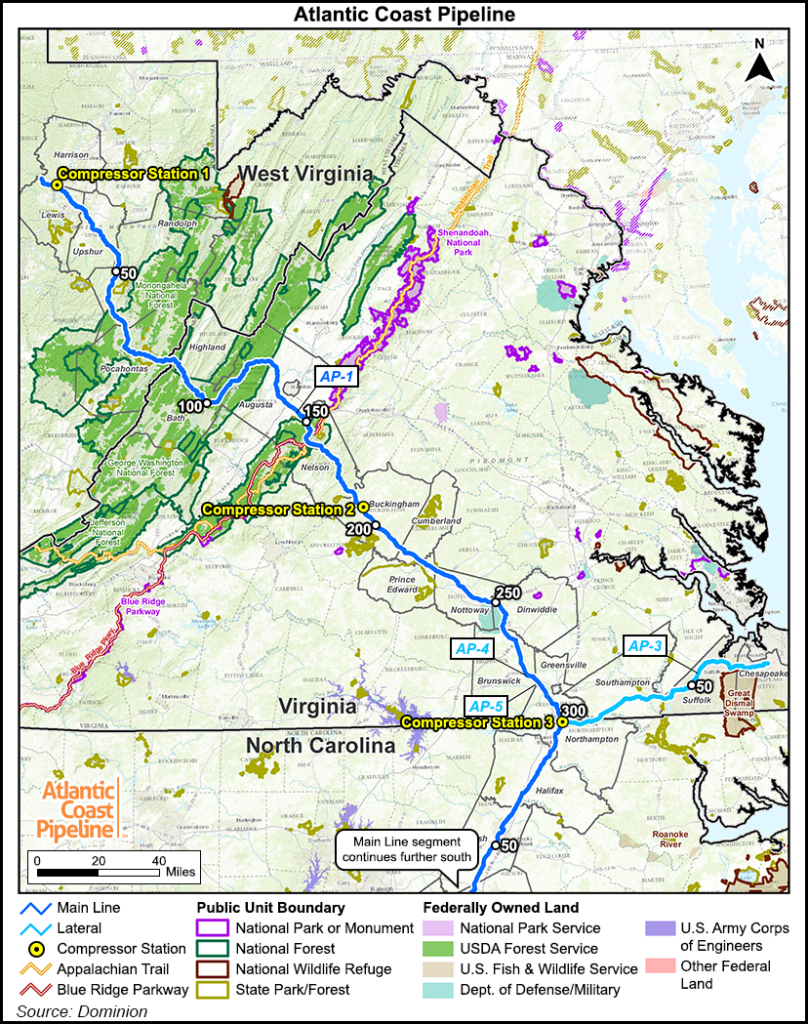Regulatory | Infrastructure | NGI All News Access | NGI The Weekly Gas Market Report
Enviros Keep Pressure on FERC to Again Halt All ACP Construction
Environmental groups are stepping up their calls for FERC to stop all construction of the Atlantic Coast Pipeline (ACP) after the U.S. Court of Appeals for the Fourth Circuit last month stayed federal authorizations allowing the project to work in two national forests.

The Southern Environmental Law Center (SELC) said a filing last week from ACP backer Dominion Energy Transmission Inc. requesting a limited notice to proceed (NTP) with tree clearing in Virginia should not be granted because the project now lacks all the necessary authorizations required by the Federal Energy Regulatory Commission certificate to proceed with any construction.
Instead, SELC urged FERC to issue a complete stop work order for the entire 600-mile route and said it should require ACP to make public confidential tree felling and environmental constraint maps that were included in the limited NTP request and for all future requests.
The Fourth Circuit stayed decisions by the U.S. Forest Service (USFS) allowing tree clearing, blasting and trenching in the George Washington National Forest and the Monongahela National Forest in Virginia and West Virginia. The court stayed the authorizations to review a challenge filed in February by the SELC and the Sierra Club on behalf of several regional environmental organizations.
SELC immediately called on FERC to halt work on the project, citing the Commission’s decision in August to stop all construction on the pipeline for more than a month after the Fourth Circuit vacated key permits from the U.S. Fish and Wildlife Service and the National Park Service. FERC said at the time that it was forced to issue the order because the project did not have all the necessary authorizations to continue. FERC lifted the order once those agencies issued revised permits.
SELC said in its filing last week that the same logic behind the August stop-work order applies to the Fourth Circuit’s latest decision.
“The problem is more dire here because, unlike the National Park Service permit, the Forest Service permit authorizes crossings of noncontiguous lands,” SELC told FERC. “Allowing construction to proceed while Forest Service approvals are on hold risks littering the landscape with pipeline segments that may never be connected.”
SELC said ACP should only be allowed to stabilize the project route as it did during the last work stoppage. Dominion said the trees it wants to clear are not located on USFS land.
The similarly routed Mountain Valley Pipeline is facing the same kind of resistance following a weeks-long work stoppage over the summer. The U.S. Army Corps of Engineers last week suspended authorization for the project to cross hundreds of streams and wetlands in Virginia after the Fourth Circuit vacated a key water-crossing permit.
Environmental groups led by the Sierra Club are also calling on FERC to halt all work on the 300-mile MVP project, arguing that it no longer has all the federal and state permits required to continue construction.
ACP would originate in West Virginia, pass through Virginia and into North Carolina to move 1.5 Bcf/d of Appalachian natural gas to the Southeast. MVP would also move 2 Bcf/d of Appalachian natural gas to markets in the Southeast and Mid-Atlantic via an interconnect with the Transcontinental Gas Pipe Line in southwestern Virginia.
© 2024 Natural Gas Intelligence. All rights reserved.
ISSN © 1532-1231 | ISSN © 2577-9877 | ISSN © 1532-1266 |
